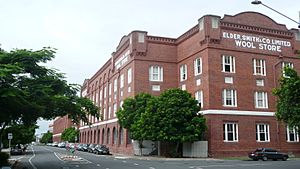Elder Smith Woolstore, Teneriffe facts for kids
Quick facts for kids Elder Smith Woolstore |
|
|---|---|

Elder Smith Woolstore, 2010
|
|
| Location | 64 Macquarie Street, Teneriffe, City of Brisbane, Queensland, Australia |
| Design period | 1919 - 1930s (interwar period) |
| Built | 1926 |
| Architect | Montague Stanley |
| Architectural style(s) | Italianate |
| Official name: Elder Smith Woolstore | |
| Type | state heritage (built) |
| Designated | 21 October 1992 |
| Reference no. | 600322 |
| Significant period | 1920s (fabric) 1926-1983 (historical use) |
| Builders | Stuart Brothers (Sydney) |
| Lua error in Module:Location_map at line 420: attempt to index field 'wikibase' (a nil value). | |
The Elder Smith Woolstore is a really old and important building in Teneriffe, Brisbane, Australia. It was built way back in 1926. This building was designed by an architect named Montague Stanley. It was used to store wool before it was sold or shipped. Today, it's a special heritage-listed site, which means it's protected because of its history and unique design.
Contents
A Look Back: The Woolstore's Story
The land where the Elder Smith Woolstore stands has a long history. Important people owned it, like Captain John Clements Wickham in 1847. Later, James Gibbon, who was a member of Queensland's parliament, owned it.
Building the Woolstore
The first building on this spot was the Moreheads woolstore, built in 1926. It was designed by Montague Talbot Stanley, a famous Queensland architect. The actual building work was done by Stuart Bros from Sydney.
The Moreheads Company
The Moreheads company was started in 1873 by Boyd Dunlop Morehead. He was a Queensland farmer, businessman, and politician. His company was very important for selling wool and other goods. They even started the first wool auctions in Brisbane in 1898. This meant farmers could sell their wool right here in Queensland.
Moreheads Ltd continued to operate for many years. In 1961, a big company called Elders took over. Elders was one of the largest "pastoral houses" in Australia. These companies helped farmers with everything from buying supplies to selling their wool and livestock.
What Happened Next
In 1983, a company called Oxlade Investments bought the woolstore. Since then, the building has been used as a furniture center. It even connects to the Australian Estates No. 1 Store next door.
What Does the Woolstore Look Like?
The Elder Smith & Co. Woolstore is a cool three-story building made of brick and timber. It has a classic style from the 1920s, with some fancy details. Like many old commercial buildings, it's built in three main parts: a base, a middle section, and a top.
Outside the Building
The building is made of red brick. It has tall, arched openings and triple windows. These features make the building look very tall. But there are also horizontal lines that make the upper floors stand out.
You can see a special band of decoration with the company name on it. The top of the building has a cool fence-like structure with arched shapes. The ground floor has open arches, like a covered walkway. This area was used for railway lines and loading wool onto trains. The top of the building also has decorative features that look like small castles or towers.
Inside the Building
The ground floor has a concrete floor. The upper floors have strong timber floors with thick posts and beams. There are old wooden staircases in the front corners. There's even an original old passenger lift near the entrance!
Walkways on the second floor used to connect this building to the Australian Estates No 1 and another woolstore called Goldsbrough Mort Woolstore. One of these walkways has since been removed.
The top floor was a showroom where wool was displayed. It has square vents with wooden slats under the windows. It also has a special "sawtooth roof." This roof shape has many peaks and valleys, like saw teeth. It's designed to let in the best natural light from the east and west. The roof is made of corrugated asbestos and reinforced glass.
Why is it a Heritage Site?
The Elder Smith Woolstore was added to the Queensland Heritage Register on 21 October 1992. This means it's officially recognized as an important historical place.
Showing Queensland's History
This woolstore is very important because it shows how Queensland's wool industry grew since the 1920s. It also tells us about the history of the Brisbane River's docks and the big farming companies that used them.
A Great Example of its Kind
The building is a fantastic example of the brick and timber woolstores built in Australian ports. It shows how these industrial buildings were designed in the 1920s. It's similar to other woolstores like Mactaggarts Woolstore and Australian Estates No. 1 Store.
Beautiful and Unique Design
The woolstore also looks really impressive. Its large size and unusual design make it stand out. The railway line running through the arches and the unique top section are very striking.
Smart Design and Building
The special mix of usefulness and style was created by MT Stanley. He was a very skilled architect and designed the nearby Australian Estates No. 1 Store too.
Important to the Community
This woolstore is a valued landmark along the Brisbane River. It has strong connections to farming and business history. Because it's so important, it's included in the Teneriffe Development Plan, which helps protect it.
 | Selma Burke |
 | Pauline Powell Burns |
 | Frederick J. Brown |
 | Robert Blackburn |

